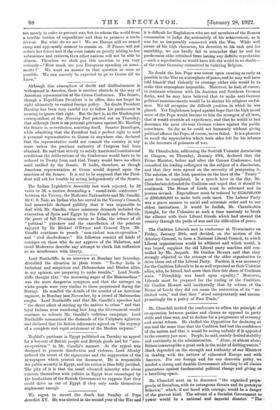Although this atmosphere of doubt and disillusionment is widespread in
America, there is another obstacle in the way of American representation at the Genoa Conference. The Senate, though a Republican President is in office, does not forget its right ultimately to control foreign policy. No doubt President Harding has been very careful not to follow his predecessor in seeming to ignore that right. But the fact is, as the Washington correspondent of the Morning Post pointed out on Thursday, that although there is no personal grievance against Mr. Harding the Senate is, nevertheless, asserting itself. Senator Brandcgee, while admitting that the President had a perfect right to send a personal representative to Genoa or anywhere else, declared that the representative could not commit the country in any sense unless the previous authority of Congress had been obtained. He said that strictly to satisfy American Constitutional conditions the deliberations of the Conference would have to be reduced to Treaty-form and that Treaty would have no effect until ratified by the Senate. It looks, therefore, as though American representation at Genoa would depend upon the sanction of the Senate. It is not to be supposed that the Presi- dent will ask for trouble by acting independently of the Senate.


































 Previous page
Previous page